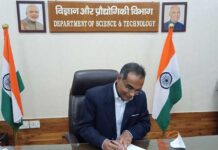New Delhi (India Science Wire): The Indian National Centre for Ocean Information Services (INCOIS), Hyderabad under the Ministry of Earth Sciences conducted a webinar to mark the World Tsunami Awareness Day 2020. The webinar titled ‘Tsunami Awareness and Preparedness’ was jointly organized with the National Disaster Management Authority (NDMA) and the Odisha State Disaster Management Authority (OSDMA). The World Tsunami Awareness Day is observed on November 5 each year across the world.
The World Tsunami Awareness Day is aimed to create tsunami awareness and preparedness at the national, regional, and community levels. It encourages the development of tsunami early warning systems in countries in addition to enhancing the awareness, preparedness, response capabilities, and resilience of coastal communities. This can be pivotal in mitigating the impact of tsunamis and protecting lives.
A tsunami is a giant wave caused generally by earthquakes in the sea. Few tsunamis are also caused due to volcanic eruptions or landslides in the seabed. Tsunamis can cause immense damage to life and property, especially in low lying coastal areas. One such tsunami that occurred on December 26, 2004, devastated large coastal parts of India. It was amongst the worst affecting tsunamis causing more than 0.23 million deaths worldwide and leaving several people missing to date.
The webinar was aimed to educate the public about tsunamis, the Indian Tsunami Early Warning System (ITEWS), and the status of tsunami preparedness in India.Dr. T Srinivasa Kumar, Director of INCOIS, Pradeep Kumar Jena, Managing Director of OSDMA, and GVV Sharma, Member Secretary of NDMAdelivered informative talks at the online event.

Dr. T Srinivasa Kumar informed that the Indian Tsunami Early Warning System (ITEWS) encompasses the detection of tsunamigenic earthquakes and resulting tsunamis in the Indian ocean, issuing alerts, and disseminating warnings to vulnerable communities. Detection of earthquakes and tsunamis is done in a real-time manner using a network of seismic stations, tsunami buoys comprising bottom pressure recorders, and tide gauges that communicate data through satellites. The potential of earthquakes to generate a tsunami at various coastal locations is estimated by real-time data analysis and numerical simulations on high-end computer systems. Dissemination of warnings to vulnerable communities is done with the help from nodal agencies such as NDMA at the national level and state disaster management agencies such as OSDMA at the state level. Regular training programs and mock drills are also conducted to increase tsunami preparedness and awareness amongst stakeholders.“The Indian Tsunami Early Warning System (ITEWS) is one of the advanced warning systems in the world. It has successfully detected all tsunamigenic earthquakes in the Indian ocean with a magnitude of ≥6.5 since 2007. The country is equipped to issue a tsunami warning in less than ten minutes of an earthquake occurring in the Indian ocean”, he said.
India is recognized as a Tsunami Service Provider for the Indian ocean by the Intergovernmental Oceanographic Commission(IOC) of UNESCO. Under their community performance-based program called the Tsunami Ready Program, “two villages of Odishawere certified as tsunami ready in 2020 making Odisha the first state and India the first country in the Indian Ocean region to receive this recognition” said Pradeep Kumar Jena.
GVV Sharma praised the steps taken by OSDMA and added that it was important to improve the last mile connectivity in issuing tsunami alerts. “Warnings and alerts should be issued through multi modes and in vernacular languages preferably without the need for a human interface through technologies such as Common Alerting Protocol (CAP). Tsunami ready programs should be extended to more areas”, he said.
INCOIS is willing to provide all technical support needed to extend the tsunami ready program to more states and union territories of India, informed Dr. Kumar. (India Science Wire)










